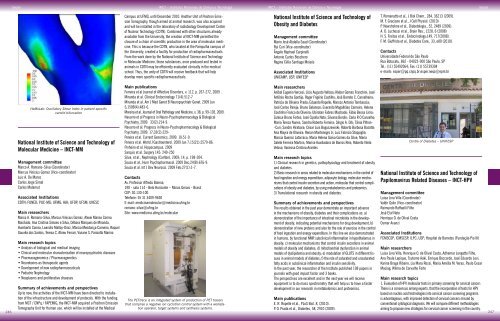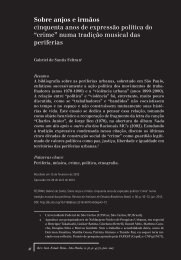livro
livro
livro
Create successful ePaper yourself
Turn your PDF publications into a flip-book with our unique Google optimized e-Paper software.
Saúde INCT – Institutos Nacionais de Ciência e Tecnologia<br />
INCT – Institutos Nacionais de Ciência e Tecnologia<br />
Saúde<br />
HeMoLab: Oscillatory Shear Index in patient-specific<br />
carotid bifurcation<br />
National Institute of Science and Technology of<br />
Molecular Medicine – INCT-MM<br />
Management committee<br />
Marco A. Romano-Silva (Coordinator)<br />
Marcus Vinicius Gomez (Vice-coordinator)<br />
Luiz A. De Marco<br />
Carlos Jorge Simal<br />
Carlos Malamut<br />
Associated Institutions<br />
CDTN; FUNED; PUC-MG; UFMG; HJK; UFOP; UFSM; UNESC<br />
Main researchers<br />
Marco A. Romano-Silva, Marcus Vinicius Gomez, Alexei Manso Correa<br />
Machado, Ana Cristina Simoes e Silva, Débora Marques de Miranda,<br />
Humberto Correa, Leandro Malloy-Diniz, Márcia Mendonça Carneiro, Raquel<br />
Gouvêa dos Santos, Teresa C. Abreu Ferrari, Viviane S. Parisotto Marino<br />
Campus at UFMG, until December 2010. Another Unit of Positron Emission<br />
Tomography, though aimed at animal research, was also acquired<br />
and will be installed in the laboratory of radiobiology Development Center<br />
of Nuclear Technology (CDTN). Combined with other structures already<br />
available from the University, the creation of INCT-MM permitted the<br />
closure of a chain of scientific production in the area of molecular medicine.<br />
This is because the CDTN, who lacated at the Pampulha campus of<br />
the University, created a facility for production of radiopharmaceuticals.<br />
From the work done by the National Institute of Science and Technology<br />
in Molecular Medicine, those substances, once produced and tested in<br />
animals in CDTN may be efficiently evaluated clinically in the medical<br />
school. Thus, the unity of CDTN will receive feedback that will help<br />
develop more specific radiopharmaceuticals.<br />
Main publications<br />
Ferreira et al Journal of Affective Disorders, v. 112, p. 267-272, 2009 .<br />
Miranda et al. Clinical Endocrinology 71(4):512-7<br />
Miranda et al. Am J Med Genet B Neuropsychiatr Genet. 2009 Jun<br />
5;150B(4):483-6.<br />
Moreira et al. Journal of Oral Pathology and Medicine, v. 38, p. 99-103, 2009.<br />
Navarro et al Progress in Neuro-Psychopharmacology & Biological<br />
Psychiatry, 2009. 33(2):214-9.<br />
Navarro et al. Progress in Neuro-Psychopharmacology & Biological<br />
Psychiatry, 2009. 17;33(2):229-<br />
Pereira et al. Current Genomics, 2009. 10:51-9.<br />
Pereira et al. World J Gastroenterol. 2009 Jun 7;15(21):2579-86.<br />
Pinheiro et al. Hippocampus. 2009<br />
Sarquis et al. Surgery 145: 249-250<br />
Silva, et al., Nephrology (Carlton), 2009; 14, p. 198-204.<br />
Souza et al., Hum Psychopharmacol. 2009 Dec;24(8):676-9.<br />
Souza et al. Int J Dev Neurosci. 2009 Feb;27(1):1-7.<br />
Contacts<br />
Av. Professor Alfredo Balena,<br />
190 - sala 114 - Belo Horizonte – Minas Gerais - Brasil<br />
CEP: 30.130-100<br />
Telefone: 55 31 3409-9650<br />
E-mail: medicinamolecular@medicina.ufmg.br<br />
romano-silva@ufmg.br<br />
Site: www.medicina.ufmg.br/molecular<br />
National Institute of Science and Technology of<br />
Obesity and Diabetes<br />
Management committee<br />
Mario José Abdalla Saad (Coordinator)<br />
Rui Curi (Vice-coordinator)<br />
Ângelo Raphael Carpinelli<br />
Antonio Carlos Boschero<br />
Regina Célia Santiago Moisés<br />
Associated Institutions<br />
UNICAMP; USP; UNIFESP<br />
Main researchers<br />
Aníbal Eugenio Vercesi; Lício Augusto Velloso; Kleber Gomes Franchini; José<br />
Antônio Rocha Gontijo; Roger Frigério Castilho; José Barreto C. Carvalheira;<br />
Patricia de Oliveira Prada; Eduardo Ropelle; Marcos Antonio Tambascia;<br />
José Carlos Pareja; Bruno Geloneze; Everardo Magalhães Carneiro; Helena<br />
Coutinho Franco de Oliveira; Ubiratan Fabres Machado; Fábio Bessa Lima;<br />
Zuleica Bruno Fortes; José Cipolla Neto; Silvana Bordin; Carla R O Carvalho;<br />
Maria Tereza Nunes; Sandra Roberta Ferreira; Sérgio A. Dib; Tânia Pithon-<br />
-Curi; Sandro Hirabara; César Luis Boguszewiski; Roberto Barbosa Bazotte;<br />
Ana Mayra de Oliveira; Renan Montenegro Jr; Luiz Fabrizio Stoppiglia;<br />
Marcia Queiroz Latorraca; Maria Helena Gaíva Gomes da Silva; Maria<br />
Salete Ferreira Martins; Marise Auxiliadora de Barros Reis; Roberto Vilela<br />
Veloso; Vanessa Cristina Arantes<br />
Main research topics<br />
1) Clinical research in genetics, pathophysiology and treatment of obesity<br />
and diabetes.<br />
2) Basic research in areas related to molecular mechanisms in the control of<br />
food ingestion and energy expenditure, adipocyte biology, molecular mechanisms<br />
that control insulin secretion and action, molecular that control complications<br />
of obesity and diabetes, by using metabolomics and proteomics.<br />
3) Translational research in obesity and diabetes.<br />
Summary of achievements and perspectives<br />
The results obtained in the past year demontrate an important advance<br />
in the mechanisms of obesity, diabetes and their complications as: a)<br />
demonstration of the importance of intestinal microbiota in the development<br />
of obesity, indicating potential mechanisms for drug development, b)<br />
demonstration of new proteins and also for the role of exercise in the control<br />
of food ingestion and energy expenditure. In this line we also demonstrated<br />
in humans, by functional NMR subclinical inflammation in hypothalamus in<br />
obesity; c) molecular mechanisms that control insulin secretions in animal<br />
models of obesity and diabetes; d) mitochondrial dysfunction in animal<br />
models of dyslipidemia and obesity; e) modulation of GLUTS in different tissues<br />
in animal models of diabetes; f) the role of saturated and unsaturated<br />
fatty acids in subclinical inflammation and insulin sensitivity.<br />
In the past year, the researcher of the Institute published 198 papers in<br />
journals with good impact factor and 3 books.<br />
The perspectives are excellent and in the next year we will receive<br />
equipment in to do mass spectrometry that will help us to have a faster<br />
development in our research in metabolomics and proteomics.<br />
T. Romanatto et al., J Biol Chem., 284, 36213 (2009).<br />
M. F. Graciano et al., J Cell Physiol. (2010)<br />
P. Newsholme et al., Diabetologia., 52, 2489 (2009).<br />
A. D. Luchessi et al., Brain Res., 1228, 6 (2008)<br />
H. S. Freitas et al., Endocrinology;149, 717(2008).<br />
F. M. Giuffrida et al., Diabetes Care., 33, e80 (2010).<br />
Contacts<br />
Universidade Federal de São Paulo<br />
Rua Botucatu, 862 - 04023-900 São Paulo, SP<br />
Tel.: (11) 55492064; Fax: (11) 55739304<br />
e-mails: esper@pq.cnpq.br;esper.nexp@epm.br<br />
Centre of Diabetes – UNIFESP<br />
National Institute of Science and Technology of<br />
Papilomavirus Related Diseases – INCT-HPV<br />
Management committee<br />
Luisa Lina Villa (Coordinator)<br />
Valdir Golin (Vice-coordinator)<br />
Raimundo Raffaelli Filho<br />
José Eluf Neto<br />
Henrique O. de Olival Costa<br />
Osmar Avanzi<br />
Associated Institutions<br />
FCMSCSP; ICMSCSP; ILPC; USP; Hospital de Barretos (Fundação Pio XI)<br />
Main research topics<br />
• Analysis of biological and medical imaging<br />
Main researchers<br />
• Clinical and molecular characterization of neuropsychiatric diseases<br />
Luisa Lina Villa, Henrique O. de Olival Costa, Adhemar Longatto Filho,<br />
• Pharmacogenomics / Pharmacogenetics<br />
Ana Paula Lepique, Tsutomo Aoki, Enrique Boccardo, José Eduardo Levi,<br />
• Neurotoxins as therapeutic agents<br />
Karina Braga Ribeiro, Lia Mara Rossi, Maria Amélia M. Veras, Paulo Cesar<br />
• Development of new radiopharmaceuticals<br />
• Pediatric Nephrology<br />
Maciag, Wilma de Carvalho Forte<br />
• Neoplasms and proliferative diseases<br />
Main research topics<br />
1. Evaluation of HPV molecular tests in primary screening for cervical cancer:<br />
Summary of achievements and perspectives<br />
There is a consensus among experts, that the incorporation of tests for HPV<br />
Up to now, the activities of the INCT-MM have been directed to installa-<br />
based on nucleic acid technologies into cervical cancer screening programs<br />
tion of the infrastructure and development of protocols. With the funding<br />
from MCT / CNPq / FAPEMIG, the INCT-MM acquired a Positron Emission<br />
The PETtrace is an integrated system of production of PET tracers<br />
that comprise a negative ion cyclotron control system with a worksta-<br />
Main publications<br />
E. R. Ropelle et al., PLoS Biol. 8, (2010).<br />
is advantageous, with improved detection of cervical cancers missed by<br />
conventional cytological diagnosis. We will compare different methodologies<br />
246<br />
Tomography Unit for Human use, which will be installed at the Medical<br />
tion operator, target systems and synthesis systems.<br />
P. O. Prada et al., Diabetes, 58, 2910 (2009).<br />
aiming to propose new strategies for cervical cancer screening in the country.<br />
247



